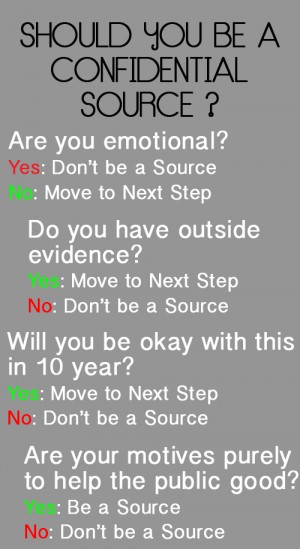Confidence in Confidentiality: Should you be a Confidential Source?
- By admin
- 16 September, 2012
- Comments Off on Confidence in Confidentiality: Should you be a Confidential Source?
People involved with businesses and nonprofits may find themselves in a position where they need to be a confidential source.
According to USLegal.com, a confidential source is “a person who provides information to a law-enforcement agency or to a journalist on the express or implied guarantee of anonymity.”Confidential sources are used frequently throughout journalism publications.
According to the Associated Press Stylebook, 13 percent of front-page news articles out of 10,000 new reports had anonymous sources in 2005.
It’s important for anyone who is considering becoming a confidential source to know how to do so and keep themselves safe.

Should You be a Confidential Source
Info from Interview with Jaclyn Cosgrove, Health Reporter for The Oklahoman
“That story is now going to be there forever,” said Cosgrove. “Remember that you can be Googled. Ask your self ‘Do I believe in what I’m doing enough that in 10 years I’m still going to believe in it?’”
Confidential sources are important because they give reporters information they may not be willing to give with their name attached.
In February 2007, Frontline did a story on why reporters need confidential sources.
“I know of very little important reporting of the last 30 to 40 years that has been done without use of confidential sources, particularly in the national security area,” said Carl Bernstein, during the Frontline report. “What we know about the last five, six, seven presidencies,  we know through the use of confidential sources. If we had relied on the information from this president, from this secretary of state, from this secretary of defense, from this vice president, we would know almost nothing of the truth.”
we know through the use of confidential sources. If we had relied on the information from this president, from this secretary of state, from this secretary of defense, from this vice president, we would know almost nothing of the truth.”
According to USLegal.com, “confidentiality is protected both under the Federal Freedom of Information Act (for disclosures to law enforcement) and under the First Amendment (for disclosure to journalists).”
Being a source can inform the public of great wrongs in society, but it can be dangerous because confidentiality can never be guaranteed.
July 7, 2005 the New York Times released a story about a reporter going to jail instead of giving away the identity of a confidential source in “Judith Miller Goes to Jail.” The story later compares Judith Miller to another reporter, Matthew Cooper. Under pressure, Cooper gives a list on confidential sources to the Supreme Court.
Also, consider the case of former Swiss banker Bradley Birkenfeld. Birkenfeld served two-and-a-half years jail time for blowing the whistle on Swiss Bank practices.
Cosgrove suggest that your reporter be someone you can trust.
“There are some reporter who might not keep you confidential,” said Cosgrove. “It’s really important to have an agreement between you and the reporter. Make sure you can trust them.”


Follow Me!